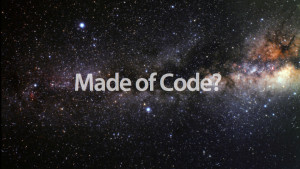
24 April 2016 – At the most recent Isaac Asimov Memorial Debate at the Hayden Planetarium in New York City (where scientists gathered this year to address the question for the year: “Is the universe a computer simulation?”) the host and celebrity astronomer Neil deGrasse Tyson argued that the probability is that we live in a computer simulation.
This is the crux of Tyson’s point: if we take it as read that it is, in principle, possible to simulate a universe in some way, at some point in the future, then we have to assume that on an infinite timeline some species, somewhere, will simulate the universe. And if the universe will be perfectly, or near-perfectly, simulated at some point, then we have to examine the possibility that we live inside such a universe.
And, on a truly infinite timeline, we might expect an almost infinite number of simulations to arise from an almost infinite number or civilizations — and indeed, a sophisticated-enough simulation might be able to let its simulated denizens themselves run universal simulations, and at that point all bets are officially off.
I began bemused. The notion that humanity might be living in an artificial reality — a simulated universe — seemed sophomoric, at best science fiction. But as I read more and had opportunities to speak with scientists and philosophers I realized that the notion that everything humans see and know is a gigantic computer game of sorts, the creation of supersmart hackers existing somewhere else, is not a joke. Exploring a “whole-world simulation,” I discovered, is a deep probe of reality.
If you follow physics and cosmology, the debate included an all-star cast: David Chalmers (Professor of Philosophy, New York University); Zohreh Davoudi (Theoretical Physicist, Massachusetts Institute of Technology); James Gates (Theoretical Physicist, University of Maryland); Linda Randall (Theoretical Physicist, Harvard University); and Max Tegmark (Cosmologst, Massachusetts Institute of Technology). It has a 2-hour run time but it is fascinating: